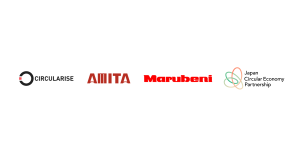Circularise has completed a successful trial with the Japan Circular Economy Partnership, setting a new standard in the fight against plastic pollution.
— Jordi de Vos, co-founder of Circularise
THE HAGUE, THE NETHERLANDS, January 9, 2024 /EINPresswire.com/ — Circularise, a blockchain platform for supply chain transparency and traceability, has completed a successful trial with the Japan Circular Economy Partnership (J-CEP), AMITA Corporation, and Marubeni Corporation, setting a new standard in the fight against plastic pollution. This collaboration has led to the creation of digital product passports (DPPs) that track and verify the lifecycle of plastic bottle caps, from collection to their transformation into high-quality recycled products.
With over 20 million bottle caps being collected globally on beaches over three decades, the urgency to address this issue has never been greater. J-CEP’s “PET Bottle Cap Collection and Recycling Project,” launched in October 2022, leverages Circularise’s cutting-edge traceability solutions to transform waste into valuable consumer products.
The trials resulted in the creation of two digital product passports (DPPs) designed to trace plastic bottle caps collected in Kobe City, Japan. These caps were sorted into polyethylene (PE) and polypropylene (PP) types, and then successfully recycled into high-quality consumer goods, marking a significant step forward in sustainability efforts.
The project’s success is not just in its environmental impact but also in its demonstration of Circularise’s supply chain traceability software with six Japanese companies. Circularise’s patented ‘Smart Questioning’ technology allowed them to test the secure sharing of material compositions without exposing sensitive data, offering a glimpse into the future of privacy-conscious, sustainable supply chains.
Circularise co-founder Jordi de Vos commented on the project’s outcomes, “Our work with J-CEP shows the potential of digital product passports to transform the recycling industry. Our vision is to arm more companies with this technology, driving a tangible shift towards a circular economy.”
Following the successful Proof of Concept (PoC), J-CEP is set to expand the conversation around the societal benefits of digital product passports in Japan. The initiative aims to establish DPPs not just as a regulatory requirement but as a strategic advantage for businesses and a benefit for consumers.
This initiative has also sparked the potential for widespread adoption of DPPs in the recycling industry, demonstrating how this technology can lead to more efficient resource use and waste reduction. Circularise’s DPP has proven effective in plastic recycling, offering detailed tracking information, and represents a significant advancement in sustainable supply chain management. This could revolutionise recycling globally, supporting the fight against climate change and serving as a model for eco-friendly practices across various industries.
Julia Semenko
Circularise
email us here
Visit us on social media:
Facebook
Twitter
LinkedIn
YouTube
![]()
Originally published at https://www.einpresswire.com/article/679751393/circularise-s-digital-product-passports-prove-successful-in-japan-s-plastic-recycling-trials






